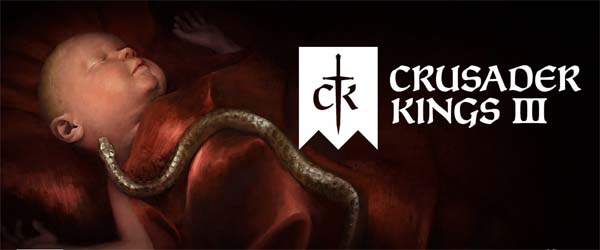
My blog readers know that I'm a fan of historic strategy games. Two of my favorite PC game franchises are Civilization and Total War, and I've dipped my hands into plenty of other historic strategy games ranging from the prehistoric Dawn of Man, all the way to Ultimate General: Civil War and Company of Heroes. But there's one prestigious set of historic strategy games that I've yet to get into. That is Paradox's historic strategy lineup of Crusader Kings, Europa Universalis, and Hearts of Iron. I own Crusader Kings II and Europa Universalis IV on Steam, and I've always wanted to get into them. I have a friend who plays them a lot, and the game looks really fun, but I was just never able to figure either of them out.
I tried booting up both a couple times and was just immediately overwhelmed. I tried the Crusader Kings II tutorial twice, and still didn't feel like I had a firm enough grasp on the game to feel compelled to keep playing. Part of that is because both games have myriad expansions and DLC that have just further complicated the games and repeatedly raised the bar of entry for newcomers. The only one of Paradox's tutorials that I felt gave me a reasonable grasp on the game was the tutorial for Stellaris.
When I saw previews for Crusader Kings III, I immediately put it on my watch list and committed myself to buying it day one, so that I could get in on the ground level in the hopes that it will be easier to grasp before Paradox starts releasing countless DLCs. It seems to have paid off, as I've been hooked on the game on and off since launch, and that addiction has cut into my Civ playing time, as well as delayed many of my blog projects and YouTube content. So for those of you eagerly awaiting new Civ strategies or the next installment of "How Madden Fails to Simulate Football", you can blame Paradox Interactive for the delay...
I am not the state
As someone who was never able to get into the previous game, I cannot say if Crusader Kings III is "dumbed-down" compared to its predecessor. It is, after all, still insanely complicated. But I definitely feel like it has a gentler learning curve and a much more effective tutorial compared to its predecessors. The hand-holding of the tutorial really did help me get a better understanding of how the various mechanics were working, and I've also found it much easier to navigate the revised U.I. and find the information that I'm looking for. I still feel like I have no idea what many of the U.I. panels mean, but I at least understand enough of the basics this time around to actually feel comfortable playing the game.
If you're unfamiliar, Crusader Kings is a medieval grand strategy game in which you play as the king of a small, European (or Middle Eastern or African) kingdom. You engage in diplomacy and court intrigue to increase your wealth and power, fight wars to conquer territory, and manage your growing holdings. But unlike a game like, say Civilization, you do not play as an abstraction of the state itself. Instead, you play as a line of rulers in a single family dynasty. You play as a single king (or queen) character at any given time. This king grows old, and eventually dies, at which point, you take control over you chosen heir and continue playing the game as that character. If you ever get to a point in which you have no family heir to carry on when you die, it's Game Over.
When your player character dies, you take over as that character's primary heir.
As much improved as the tutorial is, I do feel that it has one glaring weakness: it doesn't really cover succession. The tutorial basically puts you in control of a 40-year-old king in Ireland. It shows you how to press a few claims, use a casus belli to press those claims, create a title, deal with vassals, marry off a child, and then it basically just hands you the reigns and says "OK, now keep playing". And yeah sure, these are all the things that you spend most of the game doing. But I would say that arguably the most important part of the game is declaring your heir and setting up your inheritance to maximize the territory that your primary heir retains power over. I think succession is the single most important part of the game, and the tutorial doesn't cover it at all. When it finally happens, there's a tool tip that pops up to explain some stuff, but it didn't really help me all that much to understand what was happening, and a tool tip popping up after the fact certainly didn't help me to prepare for my king's inevitable death and inheritance.
[More]